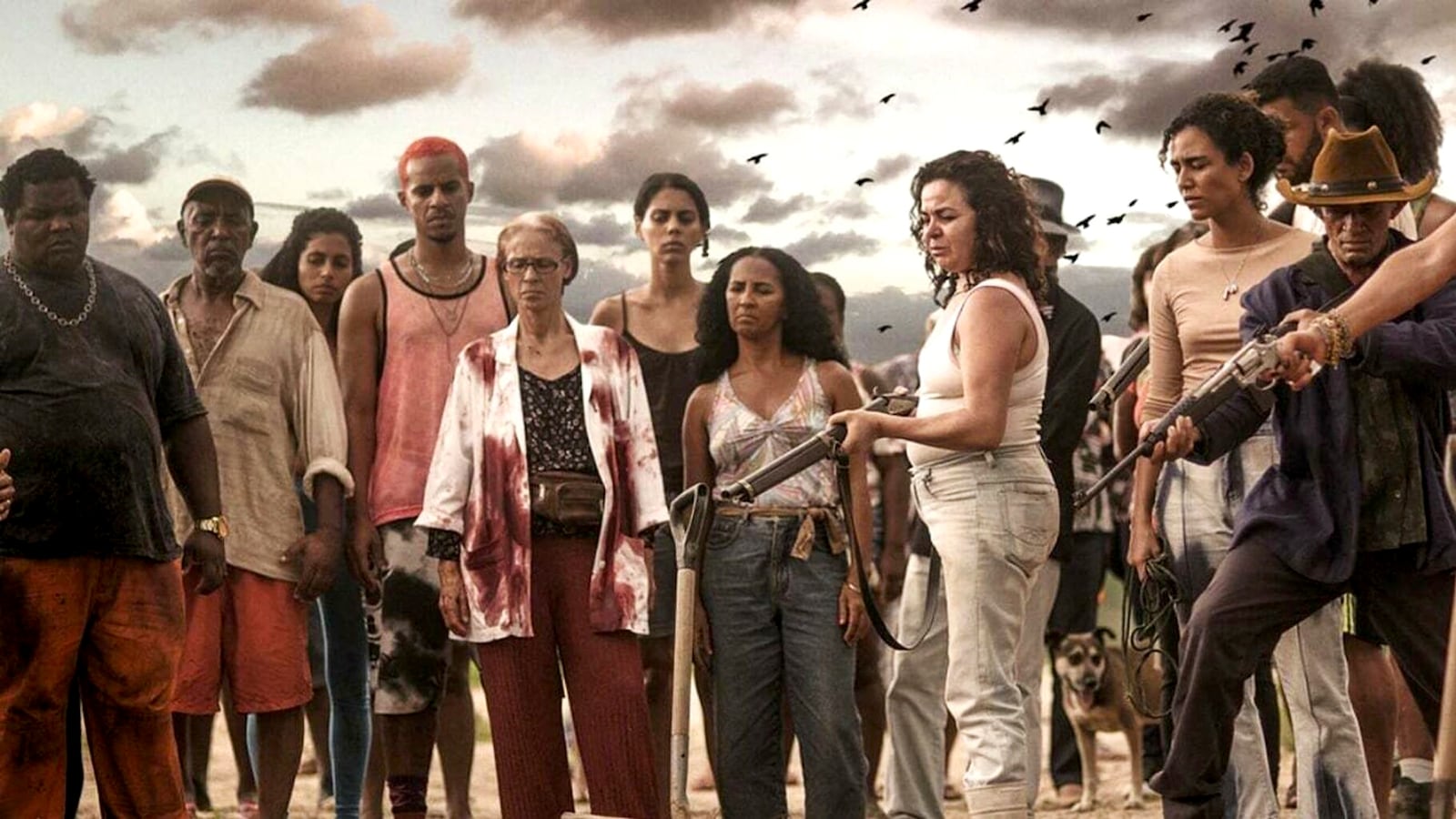Political allegories come in all sorts of outlandish shapes and sizes, and yet few are as downright weird as Bacurau (in theaters now), a social critique that’s at once straightforward and completely off the wall. A familiarity with Latin American politics will no doubt aid those interested in parsing this out-there madness. Still, adventurous moviegoers will find that a love of domestic and international genre cinema, and extreme tonal distortions, is all that’s necessary to get on the wavelength of this unique mash-up, which takes gleeful pleasure in subverting expectations at every opportunity.
Sharing behind-the-camera duties with his former production designer Juliano Dornelles, Kleber Mendonça Filho (Neighboring Sounds, Aquarius) swerves hard into down-and-dirty terrain with Bacurau, which premiered at last year’s New York Film Festival, and whose title comes from its story’s setting: a fictional town in Brazil’s rural northeast that, strangely, has vanished from all GPS maps. When coupled with the fact that regional cell service has suddenly ceased, that turn of events should strike the enclave’s inhabitants as an ominous sign. At least initially, however, it barely registers at all, too busy is everyone mourning the death of 94-year-old matriarch Carmelita (Lia de Itamaracá)—save, that is, for local physician Domingas (Sonia Braga), who interrupts the funereal proceedings to angrily decry the deceased as an evil “witch” and a “whore! Lowlife cunt!”
Things are not well in Bacurau, and that’s apparent to Teresa (Bárbara Colen) even before she arrives back in her hometown. As mysterious gunshots ring out in the distance, Teresa and her driver Erivaldo (Rubens Santos) pass by an automotive accident that’s caused a truck to spill coffins across the street—a bad omen if there ever was one. Moreover, Bacurau is dying of thirst, courtesy of the local government’s decision to divert water away from poor communities, which has consequently motivated outlaw Lunga (Silvero Pereira) to seize the nearby dam in an act of defiant rebellion. When Teresa finally reaches her destination, she finds the atmosphere surprisingly calm, in large part because everyone is zonked out of their minds on a psychotropic drug that she too promptly ingests.
“A feast of fear and terror, phantoms haunt the wake, punching holes in the trunk of night, the woodpecker’s beak,” croons Carmelita’s funeral procession, foreshadowing the borderline-nonsensical terror to come. Before violence can erupt, though, Filho and Dornelles paint an empathetic portrait of life in this outpost, where residents work at the local museum (featuring photographs of the decapitated heads of former rebel enemies) and Domingas instructs a patient to treat her hangover by vomiting, drinking water, and then vomiting some more. It’s a place that would best be described as “sleepy” if not for the anger simmering beneath its placid exterior, which rises to the surface once corrupt mayor Tony Jr. (Thardelly Lima) shows up to ask for support for his re-election campaign. His bribery—a dump truck full of books, as well as food, medicine and more coffins—doesn’t go over well, nor does his decision to take a prostitute away with him.
If Bacurau’s opening passages establish an off-kilter mood, things truly go off the rails shortly thereafter, with the first appearance of a UFO designed to resemble a flying saucer from a 1950s B-movie. In a film that’s doggedly indebted to the Spaghetti Westerns of Sergio Leone—full of quirky zooms, vast panoramas, and fluid transitional wipes—this extraterrestrial visitor is naturally out of place. As if to additionally disorient viewers, directors Filho and Dornelles also shout-out the master of horror, John Carpenter, via an expressionistic sequence set to his synth-heavy musical composition “Night.” The result is an idiosyncratic stylistic mélange that doesn’t play by conventional rules. While these disparate influences don’t always mesh seamlessly, the endeavor’s devil-may-care disinterest in coherence and lucidity is often invigorating.
As for Bacurau’s abrupt disappearance from the face of the Earth—it turns out the town is being technologically erased in order to make it vulnerable to an impending attack by outsiders. Guided by a garishly clothed São Paulo couple tasked with scouting the area on their motorcycles, these interlopers are bloodthirsty Westerners led by Michael (Udo Kier). Their purpose? They’re on a hunting holiday modeled after The Most Dangerous Game, with the goal being to slaughter everyone in Bacurau for sport. The directors thus cast their tale as a battle between innocent indigenous people and cruel foreign invaders (who may or may not be in league with crooked homegrown elements). It’s a sociopolitical critique delivered with significant surrealism, as the murderous vacationers use their UFO for surveillance purposes, and Kier, upon being called a Nazi by a comrade, responds by stating, “Next time you want to piss somebody off, don’t use those stupid clichés.”
Claiming to be set “a few years from now,” Bacurau doesn’t exist in any identifiable time period; the preponderance of cell phones, as well as online videos of hunky Acácio (Thomas Aquino) assassinating enemies, suggests the here and now, whereas the town’s primitive infrastructure is clearly the byproduct of an earlier age. Such temporal dissonance amplifies the tale’s bizarreness, as do a series of later incidents, be it two American killers becoming rowdily aroused by their lethal acts, or Michael showing his psychotic true colors and, in the process, proving (for the one billionth time) that trusting a homicidal maniac is a good way to guarantee a premature demise.
Filho and Dornelles are so busy taking left turns that they occasionally fail to generate the nail-biting suspense they seek, and their story’s scattered focus shortchanges some of their actors, most notably the illustrious Braga, who after a commanding lead turn in Aquarius is relegated to peculiar sideline duty. Still, those shortcomings are generally of little consequence, so enchanting is Bacurau’s mix of the wild and the wacko. Don’t worry about understanding its every pointed twist—from its dexterous widescreen aesthetics to its scene-stealing Kier performance (seething with the German actor’s usual brand of unpredictable insanity), it’s a blast of beguiling mayhem.


